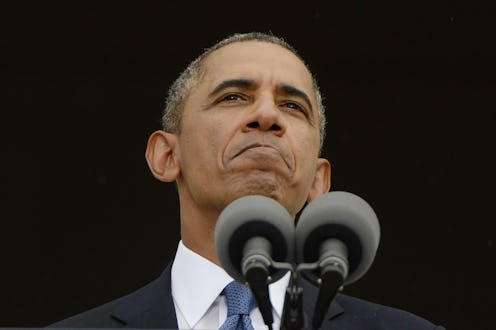News
Obama Will Wait For Congress For Syria Strike
President Barack Obama said Saturday that he was prepared and ready for a military strike on Syria, but that he has chosen to wait for congressional approval.
Speaking from the Rose Garden Saturday afternoon, Obama said that "the United States should take military action against Syrian regime targets," and that he was absolutely "prepared to give that order," adding however that he will "seek authorization from Congress."
A debate and a vote are expected as soon as Congress comes back into session on September 9.
"We should have this debate, because the issues are too big for business as usual," the president said, adding that "we must acknowledge the costs of doing nothing."
Obama also reiterated previous White House statements claiming that the measure is not intended to bring an end to the sectarian divisions in Syria, and that they're "not contemplating putting our troops in the Syrian war." The strike would be a purely punitive measure.
It's not clear, however, what would happen if Congress were to veto the action — the president made it clear that congressional approval wasn't necessary for a military strike, also emphasizing that the U.S. should and will take military action, saying, "an atrocity made with chemical weapons must not only be investigated, it must be confronted [...] We cannot and must not turn a blind eye to what happened in Damascus."
"I'm ready to act in the face of this outrage," Obama ended his speech.
Critics continue to be wary of a possible military strike, citing problems as disparate as the U.S. congressional budget and Lebanon's (already overflowing) refugee influx. TIME reports that, already, the number of Syrians in neighboring Lebanon are estimated at about 1 million — and that by the end of the year, they're likely to make up around 40 percent of Lebanon’s population, a serious issue for a country with sectarian violence of its own, not to mention limited medical facilities, power supplies and schools. The Boston Globe has pointed out that should Obama choose to strike, he would be the first U.S. President in thirty years to attack a foreign country without either acting in direct defense of the United States or having gained international support — the last leader to do so being Ronald Reagan in 1983, when he ordered the invasion of Grenada.CNN, having questioned a range of experts on the Middle East, has found a unanimous opinion: U.S. military intervention is likely to make matters worse not only for Syria, but for the U.S. as well — according to one expert, "supporting the opposition at this point would be like French-kissing Al Qaeda." Another expert suggested that a small-scale strike would simply tell Assad "that he has relative immunity from us, that he can continue to do whatever he wants short of massive chemical attacks on civilians."Even congressional spending has been put forward as a potential concern: Although right now there's enough room in the budget for a limited military strike, if the assault continued or escalated in any way — which, given what experts are saying, seems far from unlikely — costs could very quickly jump, and the Pentagon would have to ask Congress for more money. And that money would obviously have to come from other possible outlets, such as education.
Speaker of the House John Boehner responded to the speech Saturday saying "we are glad the president is seeking authorization for any military action in Syria in response to serious, substantive questions being raised." Apparently not substantive enough questions to come back early from recess, however. Boehner says the House will wait to consider a military option until the week of September 9.
Watch Obama's full speech here:
